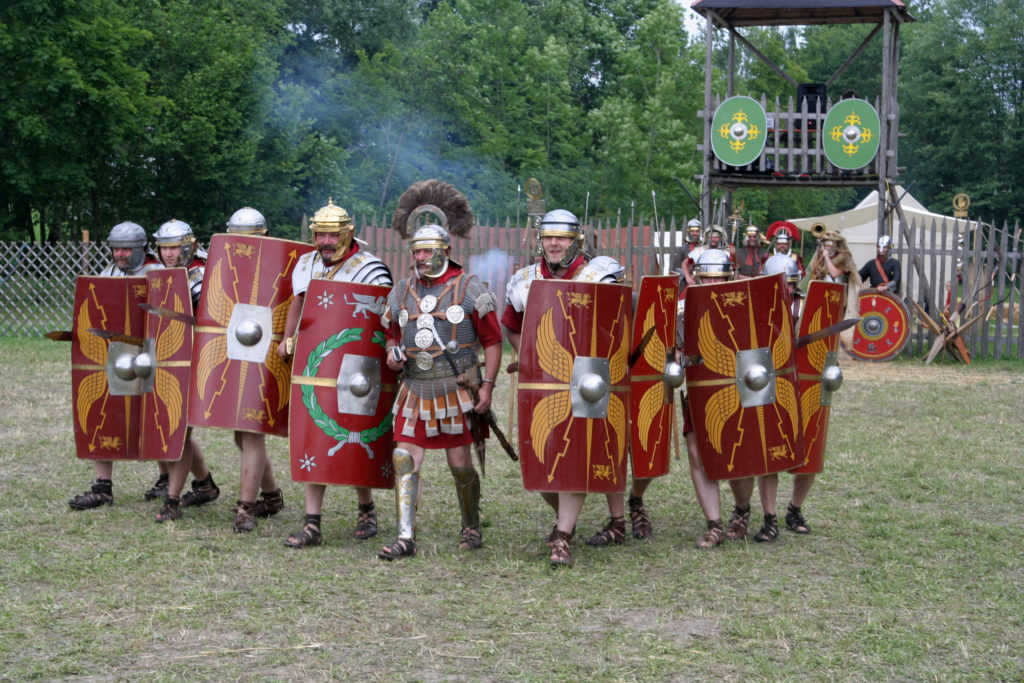[Greek] διαίρεσις (diairesis), [Latin] divisio: division, diversity, variety, diversity, distribution; 1Cor.12:4-6

A Roman legion (divisio)
Background information:
Greek Hellenism: This term means divisibility, distribution, dividing, distinction, division, and dipthong. Plato’s Sophist 267b states “Some who imitates do so with knowledge of which they imitate, and others without such knowledge. And yet what division can we imagine more complete than which separates knowledge and ignorance.” Aeschylus’ Eumenides 749 states “Correct count the ballots cast forth, friends, and be in awe of doing wrong in the division of the votes.” Herodotus’ The Histories 7.144 states “When each man was to receive then drachmae for his share, Themistocles persuaded the Athenians to make no such division but to use the money to build two hundred ships for the war.”
Old Testament: This term means class, distribution, division, share, group, inheritance, and course. Divisions can refer to armies, priests, clans, tribes, and individuals. The Jewish Hellenistic philosopher Josephus makes references to the encampment of the Roman army. Josephus states “They divide the camps within into streets, and place the tents of the commanders in the middle. The general’s own tent, in the nature of a temple, has seats for the officers superior and inferior…They live together by companies.”
New Testament: This term, occurring only in 1Cor 12:4-6, means distribution or variety. The Corinthians were constantly attracted with phenomena, such as speaking in tongues. Paul relates how these unique (distinctive) gifts come from God. Interestingly, these scriptures make individual references to the Spirt, the Lord, and God (The Father). Paul begins to develop the notion of the Trinity (three Persons of God).
Scripture:
“There are different kinds of spiritual gifts but the same Spirit.” 1Cor.12:4
The Holy Spirit gives each of us unique gifts.
“There are different forms of service but the same Lord.” 1Cor.12:5
Service can be offered to different ministries (and others).
“There are different workings but the same God who produces all of them in everyone.” 1Cor.12:6
Our gifts and talents ultimately come from God.
Conclusion:
Diary, division
I can imagine that Plato would have a field day with this term. Diairesis involves defining a broad concept, then dividing this into sub-concepts. (Example: Animal==>mammal==>dog==>Fido). I was surprised that the Latin term for this term is divisio, referring to an army.
I am not surprised that Josephus would use this term in light of the Roman occupation of Jerusalem. In the Old Testament context, division can refer to a clan, family, and tribe. Also, this term frequently refers to inheritance and share.
It is interesting that this term is only found in 1Cor.12:4-6. Paul begins to elaborate on the theology of the Trinity. Ultimately, all gifts come God.
A diary is an account events recorded in a distinct (daily) basis.
WARNING – USELESS WORDS ALERT –
Diairesis: a form of classification used in ancient Platonic logic to systemize concepts.
Diaeresis: a punctuation mark applied over a vowel to indicate that is sounded in a separate syllable (usually applying to the second vowel).
To be honest, I am more or less naïve when it comes with using these punctuation marks. I appreciate your coöperation and patience in this matter.
